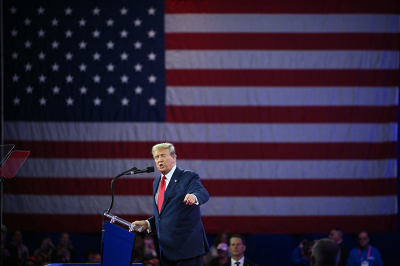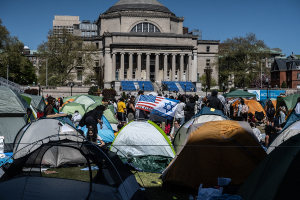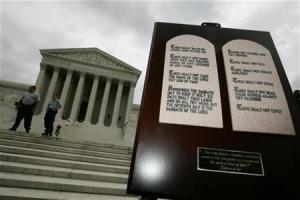With Trump ruling, Supreme Court restores voting rights of millions of Americans

In a much anticipated, historic opinion Monday, the U.S. Supreme Court unanimously reversed Colorado’s highest court and restored former President Donald Trump to the ballot for the state’s presidential primary Tuesday.
By doing so, the U.S. Supreme Court halted the Colorado Supreme Court’s unconstitutional disenfranchisement of 4.5 million registered voters in Colorado, restoring their right to make their own decision on who should be president.
The Colorado court claimed that because Trump was guilty of “insurrection,” it could remove him from the ballot under Section 3 of the U.S. Constitution’s 14th Amendment.
The 14th Amendment is one of three Reconstruction amendments adopted after the end of the Civil War, and its Section 3 was intended to keep certain Confederate military and government officials from serving in state and federal government.
Section 3 provides that:
No person shall be a Senator or Representative in Congress, or elector for President and Vice President, or hold any office, civil or military, under the United States … who, having previously taken an oath, as a member of Congress, or as an officer of the United States … to support the Constitution of the United States, shall have engaged in insurrection or rebellion against the same … But Congress may, by a vote of two-thirds of each House, remove such disability.
But all nine justices of the Supreme Court agreed in Monday’s decision that Colorado could not remove Trump from the ballot. As the unsigned opinion says, since “the Constitution makes Congress, rather than the States, responsible for enforcing Section 3 against federal officeholders and candidates,” state courts and state officials have no power to remove federal candidates from the ballot.
Section 5 of the 14th Amendment has language found in many other amendments, namely: “Congress shall have the power to enforce, by appropriate legislation, the provisions of this article.”
The high court concluded that Congress’ power under Section 5 to pass appropriate legislation to enforce the 14th Amendment “is critical when it comes to Section 3.” The court noted that the “terms of the Amendment speak only to enforcement by Congress,” not the states, and the text “does not affirmatively delegate such a power to the States.”
Although the states retain sovereign power to determine the qualifications of their own state officeholders, the court ruled, they have no such power over federal officeholders. Granting the states such “authority would invert the 14th Amendment’s rebalancing of federal and state power,” the nine justices said.
Nor is there “any tradition of state enforcement of Section 3 against federal officeholders or candidates in the years following ratification of the Fourteenth Amendment.”
Moreover, state enforcement “would be quite unlikely to yield a uniform answer consistent with the basic principle that ‘the President … represent[s] all the voters in the Nation.’” As the court explained:
Conflicting state outcomes concerning the same candidate could result not just from differing views of the merits, but variations in state law governing the proceedings that are necessary to make Section 3 disqualification determinations. Some States might allow a Section 3 challenge to succeed based on a preponderance of the evidence, while others might require a heightened showing. Certain evidence (like the congressional Report on which the lower courts relied here) might be admissible in some States but inadmissible hearsay in others. Disqualification might be possible only through criminal prosecution, as opposed to expedited civil proceedings, in particular States. Indeed, in some States — unlike Colorado (or Maine, where the secretary of state recently issued an order excluding former President Trump from the primary ballot) — procedures for excluding an ineligible candidate from the ballot may not exist at all. The result could well be that a single candidate would be declared ineligible in some States, but not others, based on the same conduct (and perhaps even the same factual record).
The “patchwork” that could result from different decisions in different states under differing legal standards (or no standards at all) on whether a candidate should be on the ballot would “sever the direct link that the Framers found so critical between the National Government and the people of the United States.”
Allowing states to have such authority to remove candidates or someone actually elected as supposedly disqualified to hold office was of great concern to the Supreme Court. The “disruption” that would cause “would be all the more acute — and could nullify the votes of millions and change the election results — if Section 3 enforcement were attempted after the Nation has voted.”
“Nothing in the Constitution,” concluded the court, “requires that we endure such chaos — arriving at any time or different times, up to and perhaps beyond the Inauguration.”
There were two concurrences in the unanimous judgment written by other justices. Justice Amy Coney Barrett agreed with the result, but said this decision doesn’t require the court to address whether federal legislation is the exclusive vehicle through which Section 3 can be enforced.
Justices Sonia Sotomayor, Elena Kagan, and Ketanji Brown Jackson also concurred in overturning the Colorado decision, but said the court shouldn’t have decided whether enforcement can occur only when Congress enacts a particular kind of legislation under Section 5 of the 14th Amendment. The three justices stressed that it was important to leave open the question of which federal officials may enforce Section 3.
Although the state of Colorado was the only party in this case, the Supreme Court’s decision is broad enough to apply to any and all attempts by a state to disqualify from the ballot Trump or any member of Congress who supposedly engaged in insurrection on Jan. 6, 2021.
Thus, this decision voids Maine’s removal of Trump from the ballot by Maine Secretary of State Shenna Bellows, who was an elector for Joe Biden in the 2020 election, or the recent similar decision in Illinois by a state judge in Cook County.
The specious efforts to remove Trump from state ballots is over. No doubt the lawfare against Trump by the Left will continue.
But with this Supreme Court decision, Donald J. Trump will be on the presidential primary ballot in every state. And if he becomes the nominee of the Republican Party, no state official will be able to remove him from the general election ballot in November.
Originally published at The Daily Signal.
Hans von Spakovsky is manager of the Election Law Reform Initiative and Senior Legal Fellow at the Heritage Foundation's Edwin Meese III Center for Legal and Judicial Studies.
Cully Stimson is deputy director of the Edwin Meese III Center, manager at the National Security Law Program, Senior Legal Fellow, and Senior Advisor to the President. Read his research.




























